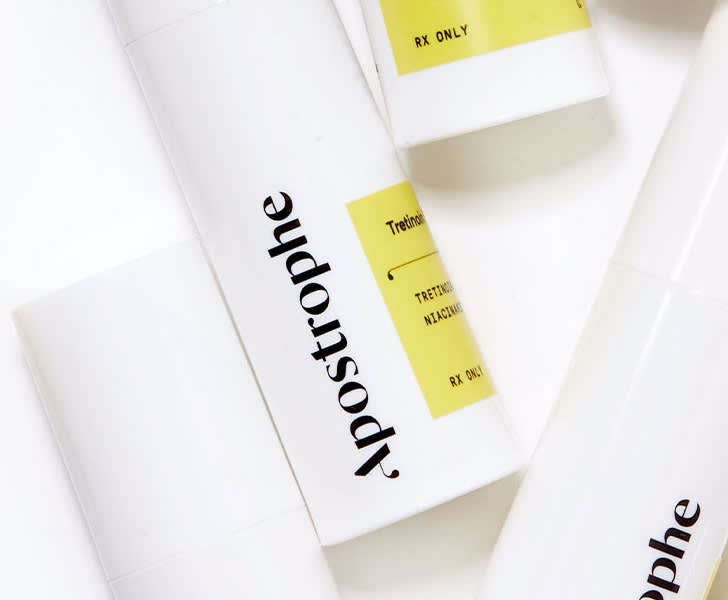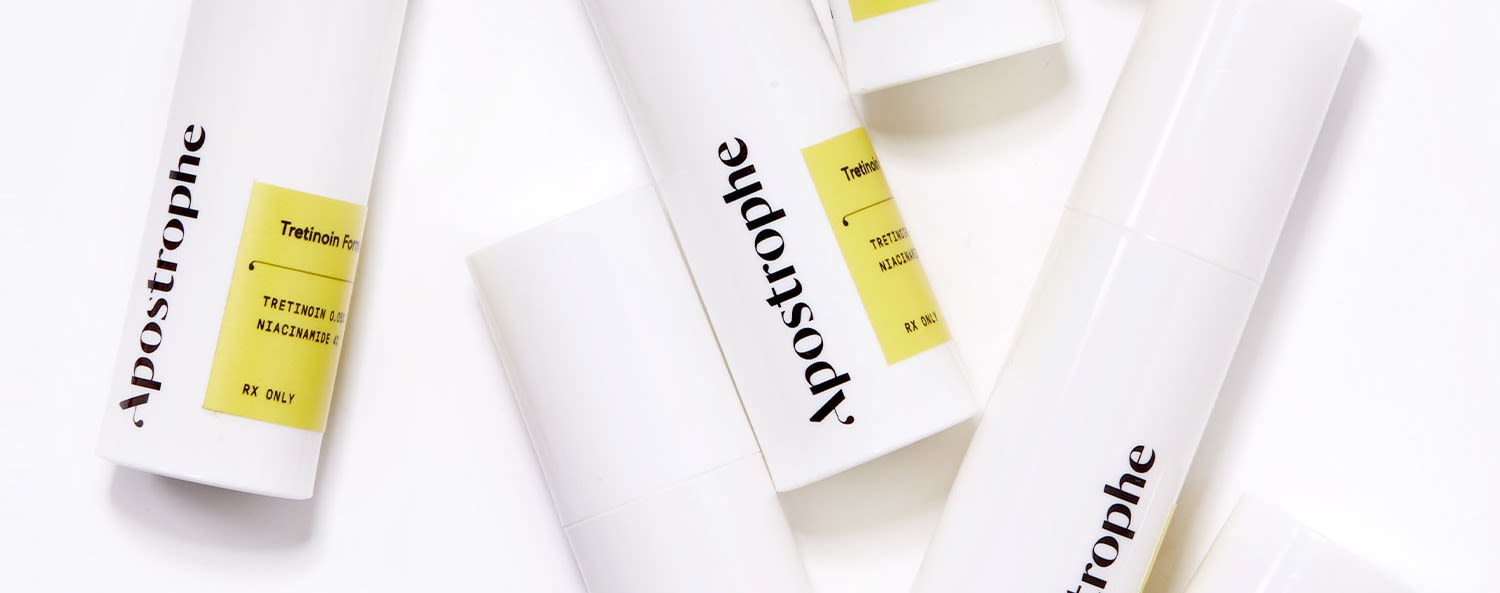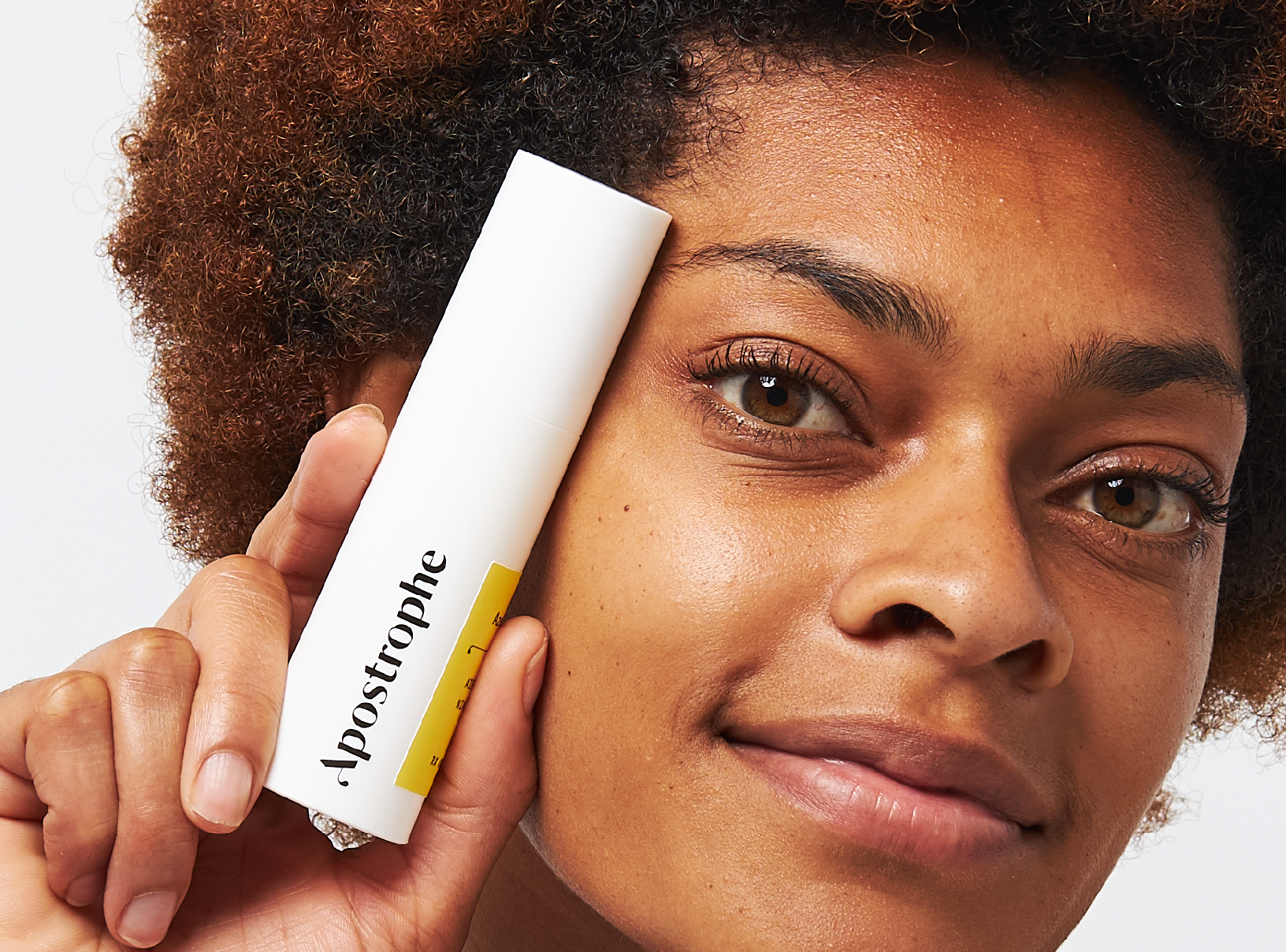Education
Retinol for acne: is retinol good for acne?


SHARE
Education
Retinol for acne: is retinol good for acne?
Medically reviewed by Kristin Hall, FNP
Written by Apostrophe Team
Last updated 11/1/2024
Whether you’re prone to small breakouts of whiteheads and blackheads or large breakouts of inflamed acne that just never seem to go away, dealing with acne breakouts can be a highly frustrating experience.
Most research into acne treatments shows that retinoids, which are medications derived from vitamin A, can help to clear up acne and prevent breakouts from coming back.
While most retinoids require a prescription, one popular retinoid, called retinol, is available in many over-the-counter creams, cleansers, and other products.
Below, we’ve explained what retinol is, as well as how it works as an acne treatment. We’ve also looked at the scientific research behind retinol to see how it compares to other popular medications for treating and preventing acne breakouts.
Finally, we’ve shared actionable tips that you can use to get the best results from retinol as a treatment for acne, either on its own or in combination with other acne-fighting products.
Retinol and Acne: The Basics
Retinol, or vitamin A1, is a popular ingredient in skin care products that are used to treat acne and reduce the effects of aging on your skin. It belongs to a class of medications called retinoids.
Most scientific research into retinol and acne looks into its effects when used with other ingredients. This makes it difficult to accurately assess retinol’s true effectiveness as an acne treatment.
On the other hand, numerous studies have found that retinol can help to treat wrinkles and other signs of skin aging.
While retinol may be effective for mild acne, stronger retinoids are available that might be better choices if you have moderate or severe acne. These include topical tretinoin and the oral medication isotretinoin.
What is Retinol?
Retinol is a vitamin that belongs to the vitamin A family. In fact, retinol itself is a form of vitamin A (it’s often referred to as vitamin A1).
Vitamin A plays an essential role in several key functions in your body, including the process of cellular differentiation that your body uses to change cells from one type to another.
It’s also involved in developing and maintaining your bones, skin, eyesight, reproductive system, immune system, and important mucous membranes that are found throughout your body.
You may be familiar with retinol as an ingredient in some skin care products, including products marketed as treatments for acne and certain signs of aging, such as wrinkles and fine lines.
For example, you can often find retinol listed as an active ingredient in topical creams, serums, cleansers, and other skin care products.
Retinol belongs to a class of medications called retinoids. Many of these are also used to treat skin conditions, including acne. Other retinoids include:
Tretinoin
Adapalene
Tazarotene
Isotretinoin
Some of these retinoids, such as adapalene, tretinoin, and isotretinoin, are more powerful than retinol.

PRESCRIPTION TRETINOIN
Target acne, dark spots, and signs of aging with this science-backed ingredient.
For example, according to research published in the medical journal Advances in Dermatology and Allergology, retinoic acid, or tretinoin, is approximately 20 times as powerful as retinol.
You can find out more about the differences between retinol and other retinoids in our guide to Retin-A vs. retinol vs. retinoids.
Because retinol is less powerful than prescription retinoids, it’s often a good medication to start with if you have mild to moderate acne and want to treat it with something that’s available over the counter.
How Do Retinoids Work?
Retinoids work by speeding up cellular turnover -- the process that your skin uses to replace old cells with new ones.
As part of the cellular turnover process, new skin cells rise from the basal layers of your skin to replace older cells on the surface. On average, it takes your epidermis -- the layer of skin that’s closest to the surface -- between 40 and 56 days to complete this process.
By speeding up this process, retinoids help to cut down the amount of dead skin cells that build up on the surface of your skin as a byproduct of cellular turnover.
As we’ve explained in our guide to the causes of acne, dead skin cells can become stuck inside your pores and cause blockages that form into blackheads, whiteheads, and inflamed acne.
Retinoids also block some inflammatory pathways, which may help to lower your risk of dealing with painful, inflamed acne breakouts.
Since retinoids and retinols speed up the rate at which your skin produces new cells, they also help to prevent certain signs of aging.
For example, retinol and some topical retinoids are used to reduce the visibility of wrinkles, sun spots, and other common forms of skin damage.
As such, you might notice an improvement in your skin’s texture and youthfulness, even if you primarily use retinoids to treat acne rather than skin aging.
Does Retinol Treat Acne?
Retinol is one of the most popular over-the-counter ingredients for treating and preventing acne breakouts.
Unfortunately, compared to other retinoids, there’s relatively little research on retinol’s effects on acne. However, a few studies have looked at the effects of acne treatments that combine retinol with other ingredients.
In a small study on 16 people published in the journal Clinical, Cosmetic and Investigational Dermatology, a topical product made of retinol, nicotinamide, and 7-dehydrocholesterol was applied directly to the skin of patients with inflammatory back acne.
After 45 days of treatment, the researchers observed that the inflammatory acne had improved or resolved in 94 percent of the study participants.
Another small study looked at the effects of a topical cream containing retinol and several other acne prevention ingredients. In this study, the people who used the retinol cream saw a reduction in mild acne lesions over the course of 12 weeks.
Finally, a study of 25 patients published in the Italian Journal of Dermatology and Venereology monitored the effects of a cream containing retinol and several other ingredients on mild facial acne.
Over a period of two months, the young women who used this cream experienced a significant reduction in total acne lesions.
While these studies are certainly promising, it’s important to remember that many used creams that contained more ingredients than just retinol.
This makes it difficult to judge what percentage of the improvement is directly attributable to the effects of retinol and what percentage is linked to the other active ingredients.
Anti-Aging Effects of Retinol
While there’s relatively little research on the effects of retinol on its own as a treatment for acne, several studies have found that retinol is highly effective at treating skin aging.
For example, a study of elderly people with visible skin aging found that regular use of a topical lotion containing retinol reduced the severity of fine wrinkles over a period of 24 weeks.
Another study involving a total of 120 women found that regular use of 0.04% retinol improved the tensile properties and contours of skin.
Retinol’s anti-aging effects mean that you may notice improvements in wrinkles, fine lines and other signs of aging even if you use retinol primarily as an acne treatment.
How to Use Retinol for Acne
Acne creams, serums, and other products containing retinol are easy to find and available over the counter, making it easy to add retinol to your acne prevention routine.
Retinol is generally a safe, non-irritating ingredient. However, it’s best to start using it slowly to limit your risk of experiencing side effects.
Try starting by applying products containing retinol one to two times per week, then adjust your usage based on how your skin feels.
Before you apply any products containing retinol, make sure to thoroughly wash your face. Our guide to washing your face properly explains how you should wash your face before you apply retinol or other acne treatments.
Retinol & Retinoid Side Effects
Retinol and other retinoids can cause side effects. The most common side effects of retinoids include excessive skin dryness, redness, scaling of the skin, and itching.
Although uncommon, some people who use retinoids experience photosensitivity to UV light, skin discoloration, swelling, and blistering. Some people who use retinoids find that their acne temporarily becomes worse after starting treatment.
Some of these side effects may be more common with stronger retinoids, such as adapalene and/or tretinoin.
If you experience any unpleasant or severe side effects after starting treatment with retinol or any other acne medication, make sure to contact your healthcare provider for assistance.
Other Options for Treating Acne
Retinol is one of numerous science-based treatments for acne. Other medications for treating acne include:
Benzoyl peroxide. This is a topical medication that stops acne-causing bacteria from growing on your skin. Like retinol, it’s a common ingredient in over-the-counter acne serums, cleansers, and other acne products.
Adapalene. This is a topical retinoid that’s used to treat acne. It works by preventing dead skin cells from building up inside your pores and causing acne to develop. Although some adapalene products are only available with a prescription, you can buy mild adapalene creams such as Differin® over the counter.
Tretinoin. This is a topical prescription medication for acne. It’s a retinoid that’s based on retinol, but has more powerful effects on your skin. We’ve discussed how it works in our guide to tretinoin for acne.
Clindamycin. This is a topical antibiotic. It works by preventing acne-causing bacteria from growing on your skin and inside your hair follicles. It also helps to decrease the swelling that can develop if you have inflamed acne.
Hormonal birth control. Several birth control pills can help prevent acne breakouts and blemishes by reducing your body’s production of certain androgen hormones.
We offer a range of science-backed acne treatments online, including personalized products that contain ingredients such as tretinoin and clindamycin.
How to Get the Best Results From Acne Treatment
Whether you use retinol or another science-based medication to treat your acne, the right habits and mentality can make a big difference to your results. Make sure to:
Wait several months before judging your results. Most acne treatments take several to three months to produce noticeable improvements. Make sure to use your medication consistently before assessing your results.
Take care of your skin. Using an over-the-counter product or prescription medication to treat acne doesn’t mean that you can forego basic skin care. Make sure to wash your face regularly and avoid skin-damaging habits like popping your pimples or spending too much time in the sun. You can learn more about good skin care habits in our guide to getting rid of acne naturally.
Try to use non-comedogenic makeup. This type of makeup is designed to reduce your risk of developing clogged pores. Look for makeup products labeled “non-comedogenic” or “oil-free.”
Our guide to dermatologist-recommended skin care tips lists more techniques that you can use to get better results from your acne treatment.
In Conclusion
Retinol is a convenient medication that offers real benefits for your skin. While research on its effectiveness for acne is limited, several studies have found that it can control breakouts when combined with other ingredients.
If you have mild acne, you may find that an over-the-counter retinol cleanser or serum helps to get rid of your whiteheads, blackheads, and other acne.
If you have moderate or severe acne, you may want to consider a more powerful retinoid such as tretinoin, which is an ingredient that could be in your Apostrophe topical treatment.
Want to learn more about treating acne? Our guide to the best acne treatments goes into more detail about science-backed medications for getting rid of acne for good.
References:
Vitamin A (Retinol). (n.d.). Retrieved from https://www.mountsinai.org/health-library/supplement/vitamin-a-retinol
Zasada, M. & Budzisz, E. (2019, August). Retinoids: active molecules influencing skin structure formation in cosmetic and dermatological treatments. Advances in Dermatology and Allergology. 36 (4), 392–397. Retrieved from https://www.ncbi.nlm.nih.gov/pmc/articles/PMC6791161/
Koster, M.I. (2009, July). Making an epidermis. Annals of the New York Academy of Sciences. 1170, 7–10. Retrieved from https://www.ncbi.nlm.nih.gov/pmc/articles/PMC2861991/
Emanuele, E., Bertona, M., Altabas, K., Altabas, V. & Alessandrini, G. (2012). Anti-inflammatory effects of a topical preparation containing nicotinamide, retinol, and 7-dehydrocholesterol in patients with acne: a gene expression study. Clinical, Cosmetic and Investigational Dermatology. 5, 33–37. Retrieved from https://www.ncbi.nlm.nih.gov/pmc/articles/PMC3295614/
Garofalo, V., Cannizzaro, M.V., Mazzilli, S., Bianchi, L. & Campione, E. (2019). Clinical evidence on the efficacy and tolerability of a topical medical device containing benzoylperoxide 4%, retinol 0.5%, mandelic acid 1% and lactobionic acid 1% in the treatment of mild facial acne: an open label pilot study. Clinical, Cosmetic and Investigational Dermatology. 12, 363–369. Retrieved from https://www.ncbi.nlm.nih.gov/pmc/articles/PMC6526677/
Vilani, A., et al. (2020, October). Efficacy and safety of a new topical gel formulation containing retinol encapsulated in glycospheres and hydroxypinacolone retinoate, an antimicrobial peptide, salicylic acid, glycolic acid and niacinamide for the treatment of mild acne: preliminary results of a 2-month prospective study. Italian Journal of Dermatology and Venereology. 155 (5), 676-679. Retrieved from https://pubmed.ncbi.nlm.nih.gov/32869963/
Kafi, R., et al. (2007, May). Improvement of naturally aged skin with vitamin A (retinol). Archives of Dermatology. 143 (5), 606-12. Retrieved from https://pubmed.ncbi.nlm.nih.gov/17515510/
Píerard-Franchimont, C., et al. (1998, November). Tensile properties and contours of aging facial skin. A controlled double-blind comparative study of the effects of retinol, melibiose-lactose and their association. Skin Research and Technology. 4 (4), 237-43. Retrieved from https://pubmed.ncbi.nlm.nih.gov/27332694/
Retinoids, Topical. (n.d.). Retrieved from https://www.aocd.org/page/Retinoidstopical
Matin, T. & Goodman, M.B. (2020, November 24). Benzoyl Peroxide. StatPearls. Retrieved from https://www.ncbi.nlm.nih.gov/books/NBK537220/
Toyalmat, L. & Zito, P.M. (2020, September 29). Adapalene. StatPearls. Retrieved from https://www.ncbi.nlm.nih.gov/books/NBK482509/
Clindamycin Topical. (2016, October 15). Retrieved from https://medlineplus.gov/druginfo/meds/a609005.html
10 Skin Care Habits That Can Worsen Acne. (n.d.). Retrieved from https://www.aad.org/public/diseases/acne/skin-care/habits-stop
Zasada, M., & Budzisz, E. (2019). Retinoids: active molecules influencing skin structure formation in cosmetic and dermatological treatments. Postepy dermatologii i alergologii, 36(4), 392–397. https://www.ncbi.nlm.nih.gov/pmc/articles/PMC6791161/
Mukherjee, S., Date, A., Patravale, V., Korting, H. C., Roeder, A., & Weindl, G. (2006). Retinoids in the treatment of skin aging: an overview of clinical efficacy and safety. Clinical interventions in aging, 1(4), 327–348. https://www.ncbi.nlm.nih.gov/pmc/articles/PMC2699641/
Like what you just read? Sign up for our email list to get the scoop on skincare science delivered straight to your inbox.

Deep Dives
A dermatologist shares his thoughts on the recent studies about benzoyl peroxide and benzene.
Read More
Education
What is milia?
What is milia? Today, we’re jumping into one type of bump that you may have heard about most commonly in infants — milia.
Read More
Education
Best moisturizer for acne-prone skin
If you have combination acne-prone skin, figuring out which moisturizer is best for your skin might be tough. In this guide, we break down the best moisturizer for combination, acne-prone skin.
Read More